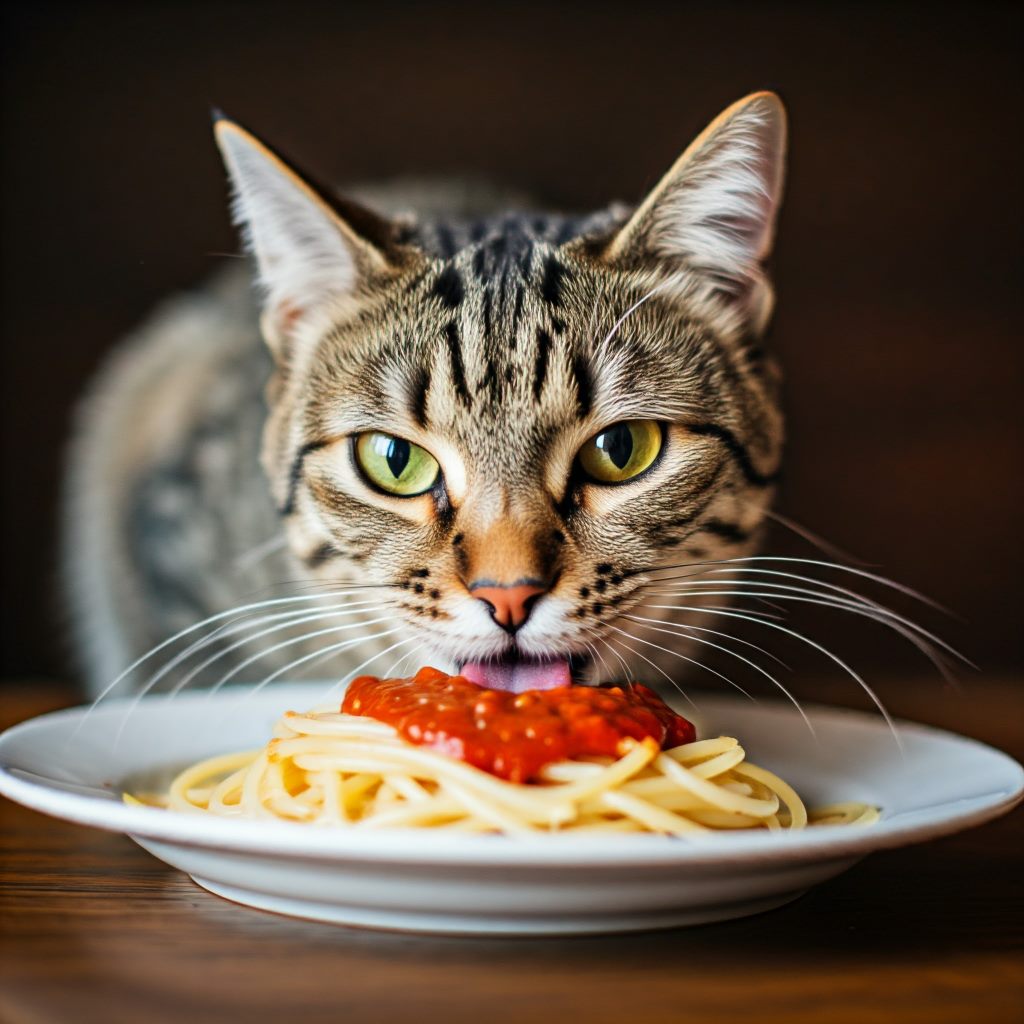
Cats are known for their love of fish and meat, but what about pasta? While pasta itself is not toxic to cats, it is not a natural part of their diet and can cause digestive issues if consumed in large amounts.
In this article, we will explore the potential consequences of cats eating pasta, including whether it is poisonous to them, if they can get sick from eating spaghetti, and whether they can eat other types of pasta or rice. We will also discuss whether cats can eat eggs, cheese, and other common ingredients found in pasta dishes, such as carbonara and tomato sauce. By understanding the potential risks and benefits of feeding your cat pasta, you can make informed decisions about what to feed your feline friend.
Here are some questions to consider when it comes to cats and pasta:
Is pasta poisonous to cats?
No, pasta is not poisonous to cats. Pasta is made from wheat flour and water, which are not toxic to cats. However, pasta is not a natural part of a cat’s diet and should not be a significant part of their nutrition.
Cats are obligate carnivores, which means they require a diet that is high in animal protein and fat and low in carbohydrates. Ingesting large amounts of pasta or other carbohydrates can lead to digestive issues and may contribute to weight gain and other health problems.
Pasta is a high-carbohydrate food, which means that it can cause problems for cats with diabetes or kidney disease. It also contains gluten, which is a protein found in wheat and rye crops and therefore can cause gastrointestinal upset for some cats.
The most common side effects of pasta consumption include diarrhea and vomiting. Because pasta has little nutritional value, it’s important to feed your cat a balanced diet with plenty of fruits and vegetables to provide your cat with all the nutrients he or she needs each day.
Can cats get sick from eating spaghetti?
It’s a common misconception that cats can get sick from eating spaghetti. In fact, cats are omnivores and have been known to eat many different types of foods.
Cats can’t get sick from eating spaghetti. The only thing that can cause a problem is if the pasta is accidentally left out for too long or if you don’t wash it before feeding it. If you do wash it, then the noodles will probably be fine.
Spaghetti is very starchy and high in carbohydrates (which are very good for cats). It’s not as high in protein as other types of pasta (like penne or fusilli), but cats don’t need much protein anyway because they’re carnivores.
Spaghetti is made up of wheat flour, water, salt and other ingredients. Cats do not have the same digestive system as humans and cannot process wheat flour as well as dogs or humans. This means that if your cat consumes enough spaghetti it may cause gastrointestinal issues such as vomiting or diarrhea.
If your cat does become ill after eating spaghetti, you should check with your veterinarian to rule out other causes for the symptoms you are experiencing.
Can cats eat pasta or rice?
Pasta and rice are not toxic to cats, but they are not a natural part of their diet and should not be a significant part of their nutrition. Cats are obligate carnivores and require a diet that is high in animal protein and fat and low in carbohydrates. Ingesting large amounts of pasta or rice can lead to digestive issues and may contribute to weight gain and other health problems.
Cats can eat pasta or rice, but it depends on the type of pasta.
Cats are carnivores, and they have a lot of different proteins that they can eat. But the most common ones are meat and fish. So, if you’re looking for a protein-rich food, this is not it.
Pasta is a good source of protein and carbohydrates, but it also contains gluten. Gluten causes digestive issues in many cats, so if your cat has a sensitivity to gluten, he may not be able to digest pasta well. Rice is an even more common source of hidden gluten than pasta.
Pasta is made from wheat, and cats can’t have gluten. If you’ve ever seen a cat lick its fur in a way that looks like it’s trying to clean itself, this is why — cats are actually cleaning themselves of the protein gluten!
Cats can’t digest gluten well at all, so if you give them pasta or bread kibble, they’ll spit it out right away. Rice is also safe for your cat to eat.
Can cats eat eggs?
Yes, cats can eat eggs. However, the egg white is not a healthy addition to cat’s diet. The yolk provides essential nutrients and vitamins that are beneficial for your cat’s health.
Also, it contains no cholesterol and is rich in protein, fat and other important nutrients. If you have a cat that loves eggs and they are available in your house, feed them to your pet as an occasional treat or treat with the intention of keeping them healthy.
Cats are carnivores, which means they need meat to survive. Therefore, cats should be fed meat-based cat food. A diet of raw meat is not recommended for cats. However, it is possible for your cat to eat eggs if you know how to prepare them properly and watch out for potential health issues.
Eggs are a good source of protein and fat, which can be beneficial to your cat’s health. But eggs are also high in cholesterol and fat, so they should be eaten in moderation by most cats.
Eggs can be a nutritious snack for cats in small amounts. Eggs are a good source of protein, fat, and other nutrients, and can provide a variety of health benefits for cats. However, eggs should not be a significant part of a cat’s diet, and cats should not be fed raw eggs on a regular basis.
Raw eggs can contain bacteria that can cause food poisoning in humans, and there is a small risk of this occurring in cats as well. Cooked eggs are generally safer for cats to consume, but they should still be fed in moderation as part of a balanced diet.
Can cats have cheese?
Cheese can be a tasty treat for cats in small amounts, but it should not be a significant part of their diet. Cheese is high in fat and calories, and consuming too much can lead to weight gain and other health problems. Some cats may also be lactose intolerant, which means they have difficulty digesting lactose, the sugar found in milk and dairy products. Symptoms of lactose intolerance in cats include diarrhea, vomiting, and gas. If you want to give your cat cheese as a treat, it is best to choose a small amount of a low-fat, lactose-free variety.
It is important to remember that cats are obligate carnivores, which means they require a diet that is high in animal protein and fat and low in carbohydrates. While cheese can provide some nutrients, it should not be a significant part of a cat’s diet.
Can cats eat carbonara?
Yes, cats can eat carbonara. But if you’re trying to make your cat a vegetarian, it’s best to keep the pasta and cheese out of the equation.
Cats can eat carbonara, but they shouldn’t be fed more than one serving at a time. Cats are carnivores and need meat to survive. They also need some protein in their diet because they’re not omnivores. The best sources of protein for cats include raw meaty bones (like chicken necks or lamb necks), raw eggs, and canned tuna.
The first thing you need to know about carbonara is that it isn’t just a traditional Italian dish — it’s actually quite common in other countries as well (like Belgium and France). It consists of pancetta or bacon cooked with cream sauce and pasta or potatoes on top.
Protein is an essential part of a cat’s diet because it helps build strong muscles and bones. Protein is also important for maintaining healthy skin and coat, and for making new hair growth.
Cats need about 30 percent of their daily calories from protein, which means that if you feed your cat a diet that’s high in carbohydrates, it will provide less nutrition than if you feed it a diet with more protein and fat content.
Carbonara is a pasta dish that typically includes spaghetti, eggs, cheese, and bacon or pancetta. While the ingredients in carbonara are not toxic to cats, the dish is not a natural part of a cat’s diet and should not be fed to them. Large amounts of pasta, cheese, and bacon can cause digestive issues and contribute to weight gain and other health problems in cats. It is best to avoid feeding carbonara or any other pasta dish to your cat.
Can cats eat pasta and tomato sauce?
While pasta and tomato sauce are not toxic to cats, they are not a natural part of their diet and should not be a significant part of their nutrition. Cats are obligate carnivores and require a diet that is high in animal protein and fat and low in carbohydrates. Ingesting large amounts of pasta or tomato sauce can lead to digestive issues and may contribute to weight gain and other health problems.
If your cat has accidentally ingested a small amount of pasta or tomato sauce, it is not likely to cause any serious harm. However, if your cat has consumed a large amount of these foods or is exhibiting symptoms such as vomiting, diarrhea, or lethargy, it is important to seek veterinary care as soon as possible. Your veterinarian will be able to assess the situation and provide appropriate treatment if needed.
In general, it is best to avoid feeding your cat pasta or tomato sauce or any other human foods that are not part of a balanced, nutrient-rich diet for cats. Cats have specific nutritional needs, and it is important to provide them with a diet that meets those needs in order to maintain their health and well-being. If you have any questions about your cat’s diet or nutrition, it is always a good idea to consult with a veterinarian or a certified pet nutritionist.

